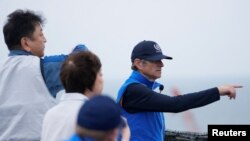The head of the United Nations’ nuclear watchdog agency met with local residents Wednesday to reassure them about the Japanese government’s plan to release thousands of liters of treated radioactive wastewater from the wreckage of the Fukushima nuclear plant into the sea.
International Atomic Energy Agency chief Rafael Grossi attended a meeting of local officials and representatives of fishing communities in the town of Iwaki, about 40 kilometers south of Fukushima.
Grossi presented the IAEA’s formal review and ultimate approval of Japan’s plan to Prime Minister Fumio Kishida in Tokyo Tuesday.
Japan says the radioactive water, which was used to cool the nuclear fuel rods at Fukushima after the 2011 disaster, has been diluted to levels well below international standards, and will be slowly released into the ocean over several decades.
Grossi said the plan to release treated radioactive wastewater from Fukushima adhered to global safety standards and “would have a negligible radiological impact on people and the environment” in a written forward to the report, which was completed after a two-year long review.
But fishing organizations say the plan will damage their reputation among Japan’s neighbors over concerns of possible contamination of fishing waters near Fukushima, namely China, which has vocally expressed its opposition against the plan as recently as Tuesday.
Fukushima fishing association chief Tetsu Nozaki criticized the government in Wednesday’s meeting for going ahead despite the association’s strong opposition.
Grossi told the attendees he does not have a magic solution to the situation, but promised that the IAEA “will stay here with you for decades to come until the last drop of water” from Fukushima “has been safely discharged.”
Grossi is expected to visit Fukushima Wednesday and open a permanent IAEA office that will oversee the release efforts. He will travel to South Korea, New Zealand and the Cook Islands after his visit to Japan to ease concerns about the plan.
The Fukushima plant became inoperable on March 11, 2011, when a 9.0-magnitude earthquake triggered a tsunami that swept across northeastern Japan before reaching Fukushima prefecture.
The high waves knocked out the plant’s power supply and cooling systems and led to a meltdown of three reactors, sending massive amounts of radiation into the air and forcing the evacuation of hundreds of thousands of residents, making it the world’s worst nuclear disaster since the 1986 Chernobyl accident.
Some information for this report came from The Associated Press and Reuters.







